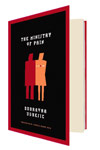
The novel-as-essay can combine an array of discursive forms, from the philosophical meditation to the rant, with characters and action that, with luck, embody the novel’s ideas. Dubravka Ugrešić’s Ministry of Pain makes pointed reference to Milan Kundera’s The Unbearable Lightness of Being, a brilliant example of the essay-novel. (Tanja Lucic, Ugrešić’s narrator and protagonist, has read the book twice and breaks down watching the movie.) In Kundera’s novel, the concepts of lightness and heaviness keep deepening. The Ministry of Pain’s central idea, however, remains unwavering: war damages everyone who comes into contact with it. The novel, an account of Croatian-Serbian-Bosnian-Albanian exiles, is a catalog of the possible effects of this damage.
The story moves quickly at first: having left Zagreb, Tanja attempts to settle in Berlin with her husband, then winds up alone in Amsterdam. Through accident and loose connections, she becomes a lecturer in servo-kroatisch (now officially three languages—with “fifty or so words that distinguish… them”). Many of her students are studying their own language to extend their visas, and most, like Tanja, are not officially refugees but are displaced and damaged, sometimes fatally so. Tanja is easygoing with her students, but after a tragic incident and a possible betrayal becomes increasingly demanding, even vicious. One student retaliates in a dramatic fashion, and Tanja, humiliated and, perhaps coincidentally, out of a job, strikes back and sinks further and further into a state of dislocation.
To summarize in this way gives no sense of the circuitous maneuvers of the book, which often seems impatient with the fiction-making machinery of a novel—characterization, the workings of plot—and eager to return to its cataloguing, rants, philosophical generalizations, and summing up of the nature and habits of “our people” both in the “former Yugo” and abroad. It’s as if the very structure of the novel is asking, “What do individual relationships matter in the face of disaster?” Characters are introduced and then disappear. With apparently small provocation, central characters move from a flirtatious friendship into attempts to do each other real harm. In the epilogue, though, they’re domestic partners, with only a brief summary to hint at whatever emotional transitions happened offstage. Tanja and her mother are the only truly rounded characters in the book: Tanja’s mother, a touching figure, is a diabetic narcissist addicted to Brazilian soap operas, gossip, and her sugar charts. When Tanja...
You have reached your article limit
Sign up for a digital subscription and continue reading all new issues, plus our entire archives, for just $1.50/month.
Already a subscriber? Sign in





